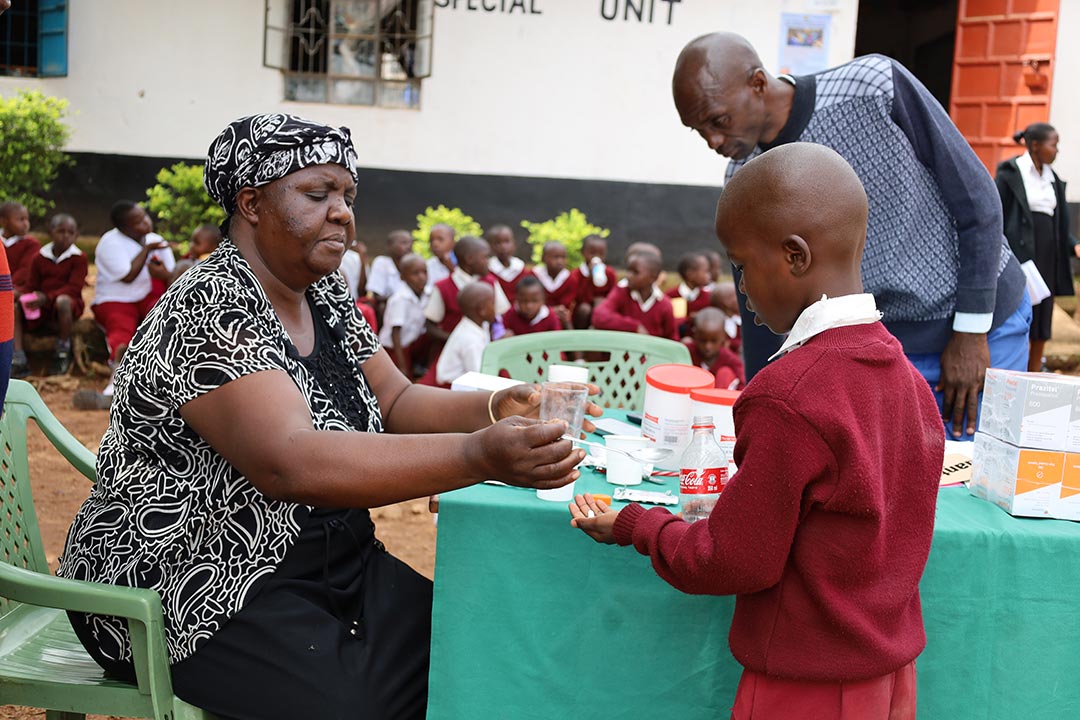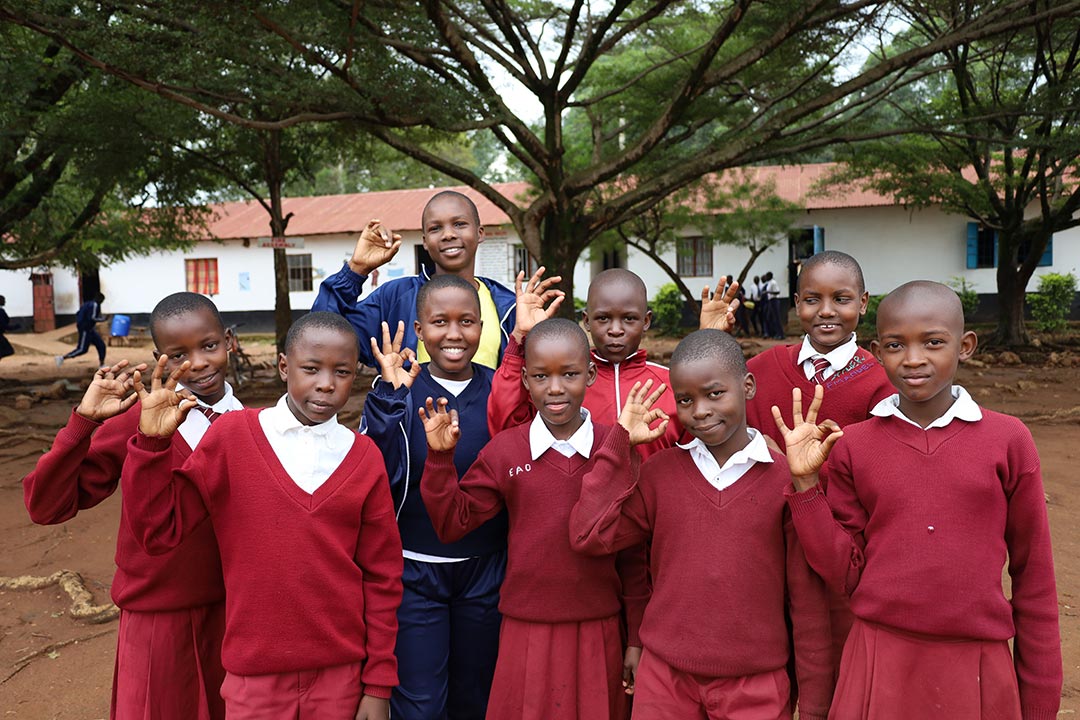by Joseph Maina

It’s the midmorning break at St Joseph’s Ombo Comprehensive School in the western Kenya town of Migori. As the sun’s ample rays filter into the wooded grounds, the chants of children playing in the compound mingle with the chirruping of birds.
“Most of my students come from disadvantaged backgrounds, [and] they are likely exposed to unhealthy conditions. Generally, the school is prone to high levels of exposure to worms. Against this background, if there is one institution that has truly benefitted from this deworming intervention, it is St Joseph’s Ombo.”
- Principal David Okello
In school principal David Okello’s office, 15-year-old Joan Jael Musumbi, a transfer student from Nairobi, is recounting her experience of a recent visit from health officials, during which St Joseph’s pupils were administered deworming medicine.

“I was so surprised to receive the medicine – for free!” the 15-year-old told VaccinesWork. “Such things never happened in my old school. I took the medicine and sometime later, my stomach felt well, and my appetite improved greatly.”
Musumbi said she also learned some lessons in hygiene, including the importance of washing hands before meals and after visiting the toilet.
High risk of wormsSt Joseph’s Ombo Comprehensive benefits from the National School-Based Deworming Programme (NSBDP), a collaborative initiative by the Kenyan government and Evidence Action’s Deworm the World programme. Launched in 2012, the programme has been targeting approximately 6 million children annually aged 2–14 years across 27 counties in Kenya with soil-transmitted helminths and schistosomiasis treatments.
Parasitic worm infections like soil-transmitted helminths and schistosomiasis mainly occur in areas with inadequate sanitation, disproportionately affecting impoverished, more vulnerable communities. Both kinds of parasitic infestation can cause gut problems, with soil-transmitted helminths tending causing malabsorption of nutrients, loss of appetite and anaemia, and schistosomiasis having the potential to cause infertility, and liver and kidney damage in advanced cases.
Migori is among the targeted counties. “We have a high prevalence for bilharzia in Migori County,” said George Ochieng from Migori County’s Department of Health, citing the Nyatike region, which regularly experiences flooding. Officials who spoke to VaccinesWork cited the county’s encumbering poverty, combined with a general lack of health education, and poor sanitation.
“This county is warmer than many other regions in the country, which makes it favourable for parasites to thrive,” said Ochieng, who until June was the County School Health Coordinator.” Sanitation is also a challenge, particularly with latrines. Though Migori has made strides, we still have challenges in some areas,” he added.
‘Exceeding expectations’Evidence for the deworming programme abounds. Since the initiative kicked off, children in St Joseph’s Ombo have recorded impressive growth milestones alongside improved performance in academics and sports since the programme kicked off. Principal David Okello explained that the children in his school generally hail from neighbouring slums, which feature high poverty levels and unsanitary surroundings.
“Most of my students come from disadvantaged backgrounds, [and] they are likely exposed to unhealthy conditions. Generally, the school is prone to high levels of exposure to worms. Against this background, if there is one institution that has truly benefitted from this deworming intervention, it is St Joseph’s Ombo.”
The principal said that he receives encouraging feedback from parents, who express their gratitude for the intervention while remarking on its impact on their children’s growth and development.
Another student, Ryan Benny, said he has taken the medicine twice. He revealed that his academic grades have improved. “I got an ‘exceeding expectations’ last term,” he said with a smile.
Winnie Agunda, who also teaches at St Joseph’s Ombo, said, “Growing up, we were generally not dewormed. The worm infections were high. I wish I could have received the opportunity, but I thank God my child is benefitting from this intervention.” Her daughter, Maria Clara, aged 12, is a student at the school and an enthusiastic handball player.
Reduced absenteeism, rising resultsObservation alone can provide a vivid picture of a child’s growth, according to Lillian Okoyo, the school’s health teacher.
“Some schools don’t get this opportunity, and a child in such a school typically looks less healthy. Once a child is dewormed, even the appetite increases. Dewormed children don’t get sicknesses easily. They are also advised before deworming about ways to maintain good hygiene.”
Save for a few pockets of resistance, mostly stemming from strong religious sentiments from some parents, Okoyo said the deworming initiative enjoys widespread positive response from the school’s parents and children.
Equally positive milestones have been recorded in other schools across Migori, partly attributed to the mass deworming intervention. There has been improved school attendance, with students’ attention in class generally improving and performance rising.
“From studies, we see that attendance was lower before this intervention. There has been reduced absenteeism, and performance in our schools has been rising. This county has constantly maintained above-average performance. Before 2012, the results were average,” Jacob Onyiego, Migori County’s Director of Education told Vaccines Work. There might be other reasons for that – but teachers and parents alike believe that the deworming programme has been a factor.
Onyiego said that Migori now comfortably clinches position two or three against other counties in the wider Nyanza region, a remarkable improvement from earlier years when the best it could manage was position six at best. The county has also been performing well in sports in recent years.
“Because of good health, our children are playing very competitive sports and we’ve even managed to take many of our teams to the national level. It is only a child of good health who can be able to perform up to that level. Migori now competes favourably in sports.”
Onyiego said that over time, people in Migori County have started to appreciate that deworming is part of good hygiene and a crucial step towards improving the health of the learners. Local communities have warmly received the intervention and look forward to seeing their children grow to their full potential.
“This deworming programme is very good,” said Onyiego. “As you’ve seen, poverty is a big challenge in this region. Not many parents can afford this luxury of deworming and therefore, this intervention is quite useful, particularly for learners who come from disadvantaged families.”